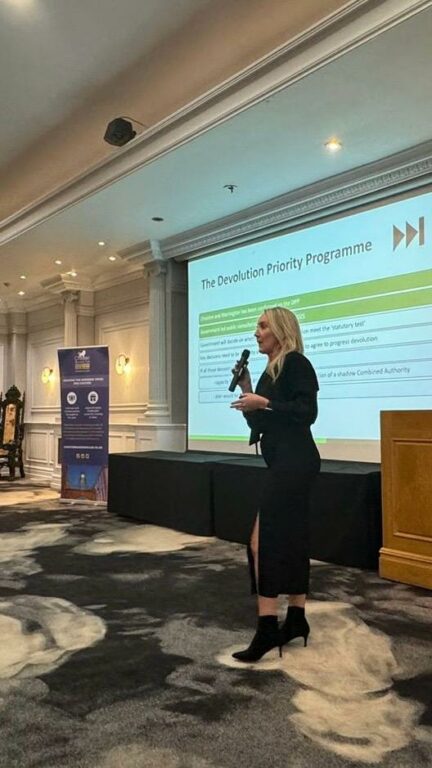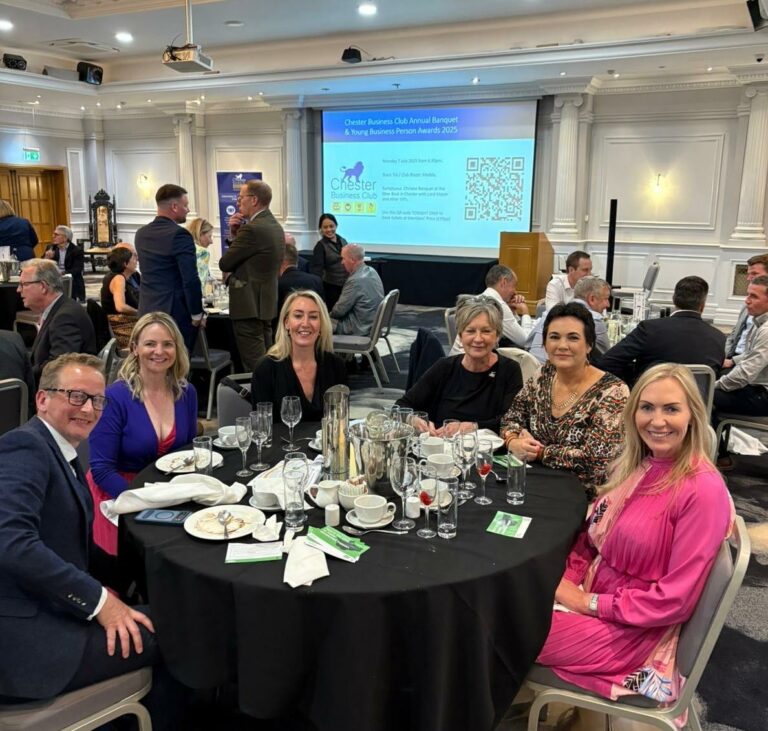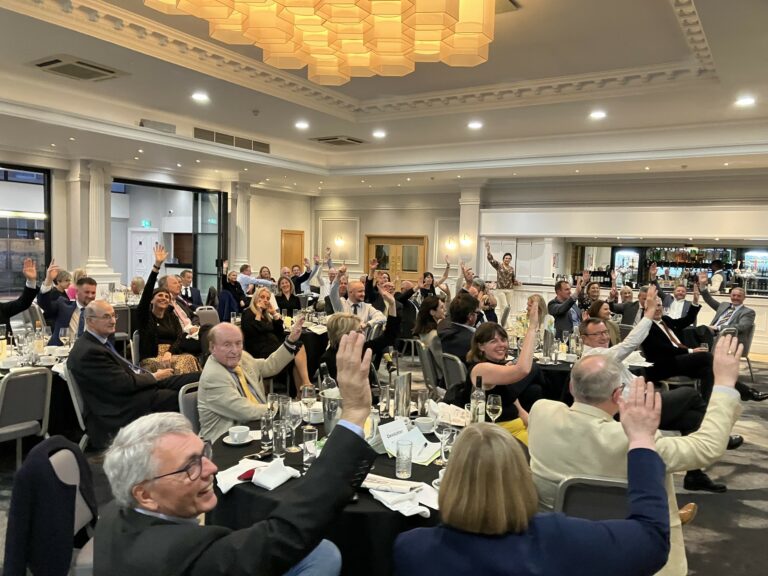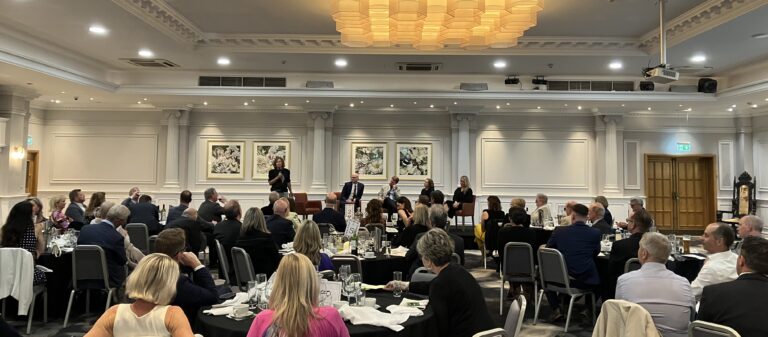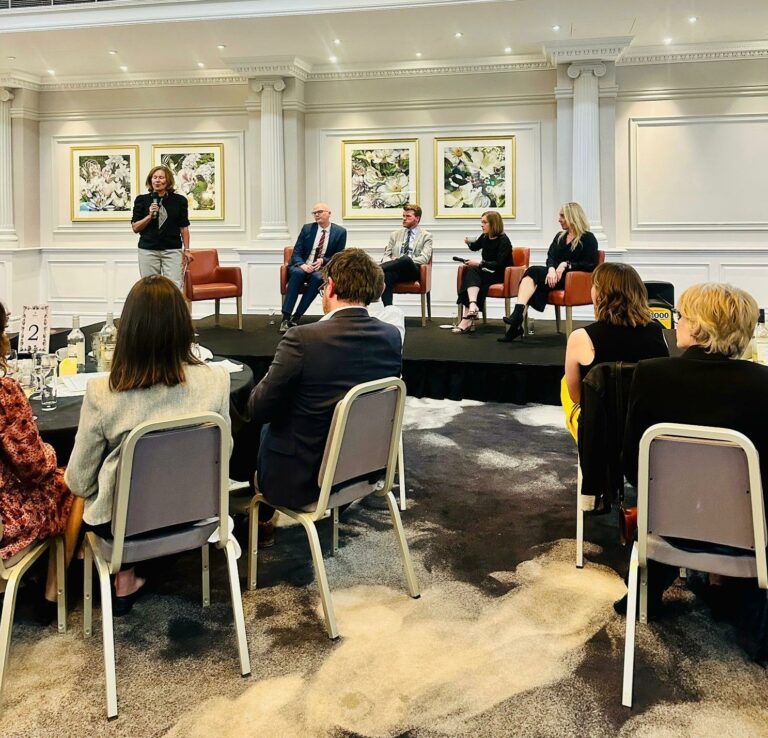Dinner at the Queen at Chester Hotel with a panel of informed leaders allowed the Chester business community to discuss this important issue.
On 22 May the Chester Business Club held a dinner for members and guests at which the Chester business community could debate the proposed devolution of Cheshire and Warrington and election of a Cheshire & Warrington Mayor.
The evening was preceded by a fizz reception at The Queen at Chester Hotel, kindly sponsored by the Hotel. Caroline Barnes, Senior Events and Meeting Co-ordinator at the recently refurbished Hotel, said,
“We were proud to support the Chester Business Club Dinner: Devolution Dialogue with a complimentary fizz reception. It was great to see business minds from across the region come together to exchange ideas and discuss such an important topic that impacts our shared future.”.
Jan Chillery as chair of Chester Business Club, welcomed members and guests and introduced Gemma Davies, Director of Economy and Housing and Rose McArthur, Director of Transport, Highways, Infrastructure and Climate Change, both from Cheshire West & Chester Council (CWACC), who gave a short presentation about devolution.
Devolution of Cheshire and Warrington will not result in the three councils (Cheshire East, Cheshire West and Chester, and Warrington) merging. Devolution is about transferring powers and resources from the national government to the local level, not about consolidating local authorities. Information, resources and latest updates are on this website: Cheshire and Warrington Devolution.
The key messages from Ms Davies and Ms McArthur were
- Devolution is about making more decisions locally, not in London.
- Through devolution, we will have more say, more power, and more control over funding.
- It will help us improve our transport, invest in more training and better jobs, supporting thriving town centres and prosperous rural communities
- Devolution will help ensure Cheshire and Warrington has the healthiest, most sustainable, inclusive and growing economy in the UK
- Better jobs, better transport, smarter investment.
The proposed lists of areas of competence (where the Combined Authority should have a mandate to act strategically to drive growth as well as support the shaping of public services, where strategic level coordination adds value) are:
- Transport and local infrastructure.
- Skills and employment support.
- Housing and strategic planning.
- Economic development and regeneration.
- Environment and climate change.
- Health, wellbeing and public service reform.
- Public safety.
Rose McArthur, Director of Transport Highways, Infrastructure and Climate Change at CWACC made these key points:
- The Combined Authority would become the Local Transport Authority with a Local Transport Board that includes lead councillors for transport.
- High quality transport infrastructure and services support growth and opportunity, and bring decisions about transport closer to people.
- Devolution will strengthen collaboration, with enhanced joint working and transport powers, and we can collaborate more effectively in our sub-region on transport.
She emphasised the 3 councils will continue to:
- Develop and adopt our own Local Transport Plan
- Move to a single Local Transport Plan for the area with local delivery plans covering each LA area
- Strategic approach to connect people with education, employment and vital amenities
- A growth focused approach to maximise returns and mechanisms to ensure that the benefits of growth remain in the area
- More control over public transport within the area – enabling more services, better coverage and simpler ticketing options
- Enables transport to contribute to delivering wider strategic objectives e.g. creating better places, improved urban realm and revitalised town centres through improving streets utilising multi-year funding linked to economic growth priorities
Ms Davies and Ms McArthur of CWACC provided further information about devolution funding and powers:
- Access to new multi-year transport funding settlements to provide committed and ringfenced funding to enable delivery of the transport plan
- Use improved transport funding offered by devolution to improve the delivery of maintenance schemes via improved asset management with better forward planning, increased economies of scale
- Reduced need to bid in competitive funding rounds and risks of abortive costs if unsuccessful
- Ability to set the transport priorities and speed up delivery for the area and not be constrained by national agendas/priorities
- Powers to raise and ringfence local funding to support and deliver the sub-regional transport priorities and initiatives
- Stability of funding which enables better forward planning and scheme development
Which they said meant:
- Bus reform – control over what goes where
- Strategic rail – fair and equivalent treatment by Great British Railways
- Local rail – statutory role in governing, managing, planning and developing the rail network across the area
- Public transport – to develop a fully integrated public transport network for Cheshire and Warrington akin to London or the Manchester Bee Network
- Active travel – multi-year funding settlements enable the delivery of strategic networks as opposed to individual schemes needing delivery within a financial year
With respect to roads, Rose McArthur stated National Highways is committed to formalising and strengthening its relationship with Mayoral Combined Authorities, which will ensure a more cohesive approach to the management and development of England’s strategic road network alongside local roads.
- Responsibility for local roads would remain with the councils and not with the Mayoral Combined Authority
- Establish and coordinate a ‘Key Route Network’ (KRN) – mayors would also hold a ‘power of direction’ over this network to support delivery of their agreed Local Transport Plan
- Empowered to regulate on-street micromobility schemes (like hire bikes), so local areas can shape these schemes around their needs, connect people to public transport
Following dinner, attendees heard from two panels, moderated by journalist Jo Henwood.
The first panel were drawn from politics and the public sector, being Gemma Davies, Rose McArthur, Cllr Richard Beacham (Lab) and Cllr Adrian Waddelove (Cons). Cllr Beacham is Deputy Chair of CWACC and the Leaders Champion of Chester’s One City Plan. Cllr Waddelove is Leader of the Conservative Group and works in public affairs in the energy sector.
The second panel were private sector business people with a wealth of experience including tourism, education, arts and health sectors. Attendees heard from Jamie Christon, DL, CEO of Chester Zoo and Chair of Marketing Cheshire; Annabel Turpin, CEO of Storyhouse and Co-Director of Future Arts Centres; Dr Paul Bissell, Professor of Public Health and Pro-Vice Chancellor for Research & Innovation at the University of Chester; and Trevor Brocklebank whose wide ranging portfolio include the Liverpool-Manchester Railway Board, co-founded Home Instead and has been a NED at the Mid-Cheshire Hospitals NHS Trust.
The moderator and panellists dined with members and guests, kindly moving tables at the end of each course to enabling them to chat during dinner with more of those present. After dinner, each panel took the stage and there were questions from attendees. A further report will follow, about discussion points raised.
Panellist Annabel Turpin, CEO of Storyhouse, commented,
“Devolution gives us the tools to think big and act local. It means culture can’t be an afterthought—it becomes central to shaping the identity of a place, attracting talent, and growing a vibrant economy. It helps us plan for the long-term, linking into wider strategies like skills and transport that directly impact our audiences and workforce. And crucially, it allows us to position arts and culture as a serious growth sector, ripe for investment and ready to deliver—because we’re not just a nice-to-have, we’re part of the solution.”.
Chester Business Club thanks everyone who attended and contributed to this discussion.
A further report will be posted here shortly, about the discussion points raised attendees during dinner; watch this space.



